- Islamic Fiqh
- /
- Miscellaneous Topics
Worshiping Allah is the purpose of man's existence:
Dear brother, since we are now in the month of Dhul Hijjah, we are going to talk about the first ten days of this month. In fact these ten days are considered one of the seasons of worship. Someone may ask, why are there seasons for worship? Because these seasons of worship encourage man to repent, to perform more acts of worship (Nawafel) or to exert more effort (in order to come closer to Allah). Lifetime is short and man sometimes get used to laziness and negligence, so these seasons like the first ten days of Dhul Hijjah, Ramadan and Hajj awaken you to the purpose of your existence on earth, namely worshiping Allah. To elaborate, consider the example of a student who travels abroad for one reason only which is to acquire high scientific degree. Definitely, there are hundreds of options abroad available to this student, but he will choose only whatever serves his goal. If he wants to live in a house, he will choose the one which is close to his university, if he wants to befriend a student, he will choose a brilliant one, if he wants to improve his language he will speak with a native speaker and if he wants to eat he will eat healthy food which will help him in his study. Thus, he chooses whatever helps him achieve his purpose. Much in the same line, we should seek whatever helps us achieve the purpose 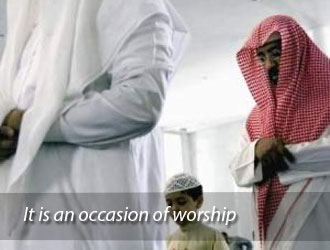 of our existence on earth; worshiping Allah the Almighty. The proof is in the following Ayah:
of our existence on earth; worshiping Allah the Almighty. The proof is in the following Ayah:
((And I (Allah) created not the jinns and humans except they should worship Me (Alone). ))
Worshiping is the concept which is distorted most nowadays. Though this concept is very wide, it is narrowed down to become merely meaningless performance of ritual acts of worship. According to some people this Deen has become performing prayers in a way that it does not even get them closer to Allah the Almighty. They seem to be applying a fiqhi rule that says: 'The obligatory is considered performed even though it does not fulfill its purpose.' You may meet a Muslim who thinks that Islam is all about performing Hajj and paying Zakat. This man does not care about his earnings, the way he spends them, the behavior and appearance of his sons and daughters and the occasions of celebrations and grief which are all westernized. How dare we expect Allah's mercy, guidance and victory over our enemies as long as we neglect acting upon His Order?
The purpose of your existence is worshiping Allah the Almighty, so Allah has made a constant pattern for the acts of worship all year long. There are ritual acts of worship, such as the five daily prayers, and there are transactional acts of worship, like honesty, trustfulness, chastity, fulfilling promises, punctuality, fairness, justice and mercy. These are the morals of the Muslim, which are best represented by the Prophet, may Allah have peace and blessings upon him., Beside these acts of worship and morals, Muslims are blessed with seasons of worship through which they are able to move to better levels by taking quantum leaps.
The Hadith of the Prophet PBUH concerning these ten days:
To tell you the truth, I will never have enough of the statement said by our Master Sa'd: "Three things I consider myself a real man doing them and other than them I am just one of the common people. One of them is that I've never heard something from the Prophet, may Allah have peace and blessings upon him, but I know for sure that it is the truth that is revealed to Him from Allah the Almighty". Listen what the Prophet, may Allah have peace and blessings upon him, told us about the first ten days of Dhul Hijjah:((Abdullah Ibne 'Abbãs radiyallahu anhu related that the Prophet sallalahu alayhi wasallam said, "Good deeds performed on other days are not superior to those performed on these (first ten days of Dhul Hijjah)." The Companions radiyallahu anhum inquired, "Not even Jihãd?" He replied, "Not even jihãd, except for that person who goes out putting himself and his wealth in danger and does not return with anything."))
Someone of you may wish that he could be with whoever is performing Hajj, but actually you have the same chance while staying at home; out of profound wisdom you can resort to Almighty Allah Some people are able to visit the House of Allah, but other people cannot for some reasons, so they stay at home. During these days, Hujjaj (pilgrims) spend their time remembering Allah, reciting Quran, performing acts of obedience and doing good deeds. They dedicate their times to worship Allah the Almighty. You can do the same even if you are at home; you can exalt and draw closer to Allah on these ten days according to the Hadith of the Prophet, may Allah have peace and blessings upon which was reveled to him by Almighty Allah. He said that these ten days are the best days of the year, but do you know why? It is because these ten days are considered a season of worship through which man can draw closer to Allah.(("Good deeds performed on other days are not superior to those performed on these (first ten days of Dhul Hijjah)." The Companions radiyallahu anhum inquired, "Not even Jihãd?" He replied, "Not even jihãd, except for that person who goes out putting himself and his wealth in danger and does not return with anything."))
It is a reference to whoever intends to go out himself for Jihad in Allah's Cause taking his wealth with him and he dies in the battle and returns with nothing.
Tranquility is the outcome of obeying Allah:
In fact, the western lifestyle is based on consuming, relaxing, surrendering to lusts and believing that the worldly life is the home that will remain forever The Muslim believes that the worldly life is a place of endeavor, while the non-Muslim considers it a place for relaxing and enjoyment. This explains why man's desire to do good deeds is missed when he thinks that the worldly life is everlasting:((O you who believe! What is the matter with you, that when you are asked to march forth in the Cause of Allah (i.e. Jihad) you cling heavily to the earth? Are you pleased with the life of this world rather than the Hereafter? But little is the enjoyment of the life of this world as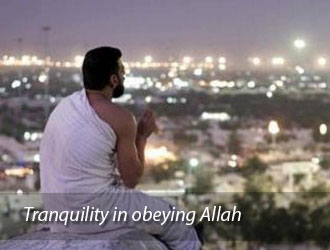 compared with the Hereafter. ))
compared with the Hereafter. ))
You think that it is enough for you to be satisfied in the worldly life, but let me tell you that neither the believer nor the non-believer will find rest in it, because Allah says:
(("But whosoever turns away from My Reminder (i.e. neither believes in this Qur'an nor acts on its orders, etc.) verily, for him is a life of hardship, and We shall raise him up blind on the Day of Resurrection." ))
This is a Divine law. In another Ayah Allah says:
((Verily, in the remembrance of Allah do hearts find rest.))
Some interpreters raise questions about the following Ayah, but they also have the answers to them:
(("But whosoever turns away from My Reminder (i.e. neither believes in this Qur'an nor acts on its orders, etc.) verily, for him is a life of hardship, and We shall raise him up blind on the Day of Resurrection." ))
They ask: How could someone who owns thousand millions have a life of hardship? He owns a house, food and drinks, and he is pleased with his meetings, parties and travels. He lives like a king, so what a life of hardship does he have? The answer of the interpreters is: There is no rest in the heart, Allah says:(( And the earth, vast as it is, was straitened for you))
The rest of the soul can be found by obeying Allah.
((Verily, in the remembrance of Allah do hearts find rest.))
What a precious feeling it is when you feel that Allah loves you and is pleased with you. How valuable it is when you act on what pleases Allah, and you will find Allah's promise for you is fulfilled after death.
The virtues of the occasions for worship:
Some of the virtues of the occasions for worship are improving one's performance of acts of worship, duplicating efforts, reconciling with Allah and taking a quantum leap. It is a leap towards repentance for the sinner, towards perfecting the performance of acts of worship for the repentant, towards Islamic knowledge for the worshipper, towards having faith for the Muslim and towards philanthropy for the believer. The main thing is that there should be a leap.
The following above mentioned Hadith was reported by Imam Al-Bukhari, and the following one was reported by Ad-Darami:
((''There is no deed that is better in the sight of Allah or more greatly rewarded than a good deed done in the (first) ten days of Al-Adha''. He, may Allah have peace and blessings upon him, was asked, "Not even Jihad for the sake of Allah?" The Prophet, may Allah have peace and blessings upon him, replied, "Not even Jihad for the sake of Allah, unless a man goes out himself for Jihad taking his wealth with him and does not come back with anything."))
This second Hadith confirms the first one. Never rationalize whatever is mentioned concerning these ten days and devote yourself to worshiping only instead.
Making use of something doesn't entail knowing all about it:
Dear brother, the level of worship decreases if the wisdom behind some matters are very obvious, but that level increases if the wisdom behind certain matters is kept uncovered. Thousands of unbelievers look after their health simply because it is for their benefit to do so. Hence, when you know that doing something serves you, you seek doing it because you worship your ownself instead of worshiping Allah and because you are keen on maintaining your own safety and happiness. On the other hand, when you don't make use of something in the short run, and the wisdom within it is unrevealed to you, your level of worshiping Allah increases. Let me give you an example and follow it with a crucial points the scholars refer to. If an illiterate person owns an air conditioner, he will able to turn it on and enjoy the cool breeze if it is too hot. He knows nothing about the mechanism of the air conditioning, but he only knows how to press the on button. Like this man, the person who has got PHD in physics, has got a certificate in manufacturing air conditioning, has air conditioning factory and is fully aware of the slightest details of the air conditioning, will be able to turn the air conditioner on in order to have cool breeze. Thus both the ignorant and the scientist know how to get cool breeze.
Scholars have mentioned the crucial point saying, "Making use of something is not part of being aware of it." You might be able to use something that is totally ambiguous to you. For example, you benefit from the fruits you eat though you don't know their nutritional values. Similarly, you will reap the fruits of worshiping Allah and performing the acts of worship although you are not aware of the wisdom behind doing that. We may be able to know the wisdom behind every act of worship, and we may not. Nevertheless, we will undoubtedly succeed when we perform them.
The Greatness of Allah the Almighty:
There are other texts from Quran (related to the ten days of Dhul Hijjah), and at top of which is the following Ayah:((By the dawn; *By the ten nights (i.e. the first ten days of the month of Dhul-Hijjah),))
Some interpreters said: "This Ayah refers to the first ten days of Dhul Hijjah."
((By the dawn; *By the ten nights (i.e. the first ten days of the month of Dhul-Hijjah),))
This Ayah leads us to the oath in the Noble Quran. Man usually swears by the Greatest, such as saying "By Allah". Swearing by Allah means that you are a mortal weak ignorant human being. In this Ayah, Allah Himself swears, is there anyone who is greater than Him?
Allah's Perfection and Greatness are absolute, Allah says:
((By the dawn))
I admire the indication mentioned by some scholars regarding this Ayah. They said: "When Allah the Almighty swears by something, He intends to attract our attention to it, and when He doesn't swear, it is referred to Him." Accordingly when He says:((So I swear by Mawaqi (setting or the mansions, etc.) of the stars (they traverse).))[Al-Waqi'ah, 75], He refers to the long distances between stars. The most recent discovered distance is 20 billion light years away:((So I swear by Mawaqi (setting or the mansions, etc.) of the stars (they traverse).))
If an astronomer reads this Ayah, he will prostrate, but why? Because "settings" don't refer to the star in that place at the time of spotting it; what we see now is the light of that star which traveled 20 billion light years and has reached us just now. What we see by the telescope is the light of the star, so where is the star by now? Some galaxies travel at the speed of 240 thousand kilometers per second. They were at a certain spot, and they traveled to us 20 billion light years, but where are they right now?So when Allah swears by something then we are meant to pay attention to it, Allah says:
((By the dawn))
Do you think the dawn is an easy matter? The dawn means that the earth has a spherical shape because the sphere is the only geometric shape behind which light and dark are merged into each other when it rotates before a source of light. You are on earth (sphere) and it revolves, so this is how dawn is formed:
((Allah merges the night into the day, and He merges the day into the night.))
((By the dawn; *By the ten nights (i.e. the first ten days of the month of Dhul-Hijjah),))
Other interpretations of the ten days:
There are other interpretations of the ten days. Some said that these ten days are mentioned in the following Ayah:((And they stayed in their Cave three hundred (solar) years, and add nine (for lunar years).))
If these years (during which they stayed in the cave) are calculated according to the solar year, they are 300 years, and if they are calculated according to the lunar year, they are 309 years. Hence, the difference between the two systems is the ten days, and this Ayah refers to the difference between the solar year and the lunar one. Such interpretation fits the context of the Ayah. Suppose that you stands by the sea and you say mina'a (Arabic word which means either seaport or the clock dial ) and aqareb (Arabic word which means either scorpions or the hands of the watch), these two words are not in harmony with each other nor are they with the text, but if you are not by the sea, and you mean by mina'a the clock dial clock and by aqareb the hands of the watch then there will be harmony between the two words.
The ten days in the above mentioned Ayah (the second Ayah of Surat Al-Fajr) can be a reference to the difference between the solar year and the lunar one, or they can be as some scholars said the first ten days of Dhul Hijjah.
((Ibn 'Umar said, 'The months of hajj are Shawwal and Dhul-l-Qa'dah and (the first) ten days of Dhu-l-Hijjah.' And Ibn 'Abbas said, 'It is the Sunnah that a man shall not enter the state of ihram except in the months of pilgrimage'. Usman (RAA) disapproved of a person who had worn Ihram from Khurasan, or Kirman.))
Quran is polysemous and no one can own it ( restrict Its Words to one interpretation only). The Prophet, may Allah have peace and blessings upon him, testified that they are the best days in the worldly life as it is reported in the Prophetic Hadith.
The Prophet PBUH encouraged us to offer good deeds on these days:
The Prophet, may Allah have peace and blessings upon him, encouraged people to offer good deeds on these days, because of the honor of the time and the place they are characterized by. It means that those who do not have the chance to be in the House of Allah during these days are honored by this period of the time, and those who have the chance to witness them while they are in the House of Allah performing Umrah or Hajj are honored by the place where they are. Therefore, it is an honor of time and place.Allah the Almighty has chosen His Sacred House among all places, and He has chosen the month of Ramadan and the ten days of Dhul Hijjah among all times. Hence, He has chosen a place, time and a man. Allah has chosen the place to make tranquility extend to all places, not to restrict it to this particular place, but; if the pilgrim is connected to Allah in His Sacred House, this connection should continue when he goes back to his country. Allah has chosen this place in order for the pilgrims to spread tranquility in all places on earth, and He has chosen certain periods of time such as Ramadan and the ten days of Dhul Hijjah in order for people to spread tranquility in all year long. Allah want you to take a quantum leap (to seize the opportunity in the chosen place and time) and maintain it all year long. The problem is that most people obey Allah in the seasons of worship only, so when these periods are over, they commit the sins they use to commit before these seasons, and they deviate once again from Allah's Path. Verify, this kind of people never exalt in the Sight of Allah the Almighty.
I repeat: The Prophet, may Allah have peace and blessings upon him, encouraged us to offer good deeds on these days for the honor of the place and the time they are characterized by. Good deeds are abundantly rewarded by Allah, and to be honest with you the ways to offer good deeds are countless and the gates which lead to them are wide open. Every good deed is accepted by Allah the Almighty if it is sincere; done for the sake of Allah, and if it is performed properly; according to the Sunnah. Furthermore, the Prophet, may Allah have peace and blessings upon him, recommended us to say Tasbeeh, (Subhana Allah 'Glory be to Allah Who is above all faults') Tahmeed (Alhamdu Lillaah 'All praises be to Allah') and Takbeer (Allahu Akbar 'Allah is the Greatest') on these days as it is mentioned in the following Hadith:
((Abdullah Ibne 'Umar radiyallahu anhu related that Rasoolullah sallalahu alayhi wasallam said, "No days are as weighty with Allah and so liked by Him for good deeds than the first ten days of Dhul Hijjah. So on these days increasingly read Subhãnallah, Lã ilãha illallãh, Alhamdulillah and Allahu Akbar."))
At-Tawheed (Monotheism):
As a commentary on the aforementioned Hadith, what does Tahleel (saying Laa ilaaha illa-Allah) have to do with our topic? It has to do with the desperate need of Monotheism, particularly these days. Some people believe in gods other than Allah, like worshiping unicorn. You can find how shirk (polytheism) is represented by fearing and worshiping gods other than Allah, and some people submit themselves to those gods, so Laa ilaaha illa-Allah is the word of monotheism (Tawheed), which means that only Allah is the Giver, the Preventer, the Superb Vanquishe, the Bestower of Honor and the Humiliator. However some people whose faith is weak think that they are honored if the powerful are pleased with them, and that they will be humilated if they fight against them. This shows how weak their faith is, so this is the time when Muslims are in dire need of Tawheed:((And to Him return all affairs (for decision). So worship Him (O Muhammad) and put your trust in Him))
Reconciliation with Allah:
Columbia is a huge space shuttle which launched with a crew of seven top astronauts. Among the crew was an Israeli astronaut who bombed the nuclear reactor in Iraq. He trained for four years in order to travel to the space. Everything was going fine when the astronauts' photos were broadcasted live as they were laughing and having fun. Nevertheless, while they were few seconds far from landing on Florida, the shuttle touched the atmosphere, turned into a fireball and shattered to pieces. One of those pieces, which was as big as a car, fell on an area in Texas called "Palestine". This accident is a supernal lesson to people on earth, and the well-trained astronaut who trained for four years was demised by Allah for unknown reasons. Accordingly, NASA announced that no more space shuttles should be launched until the reason behind the burning of Columbia space shuttle is known.This reminds me of what a friend of mine told me four years ago. He is a doctor and now he is deceased, may Allah have mercy on his soul. Four years ago, he told me that he was in Mecca performing Umrah in Ramadan, and on the last day of Ramadan they finished Quran (in Taraweeh) so there was Du'a for Khitmah (after finishing reciting the entire Quran which was started with on the first day of Ramadan). The Du'a was performed by the Imam of the Haram who kept crying and supplicating Allah asking Him to destruct our enemies, particularly the Israelis. The prayers were touched by that Du'a, and they cried a lot. At the same time when the prayers were making that Du'a, two helicopters were flying with 125 Israelis officers fighters on board, and who cost Israel millions of dollars on each one of them. They were trained how to use all electronic devices, they were taught Lebanese and standard Arabic and they were trained how to use the cold steel and other complicated weapons, so you can say that every one of them equals one thousand of fighters. While the two helicopters were flying, the one which was above fell on the helicopter that was below it, and both crashed on a colony in Israel. This was the most devastating human loss Israel had ever had. When they opened the black box they found that the pilot of the upper helicopter had sent them the following message: 'I am crashing and I have no idea why.
Hence, when Allah intervenes, the enemy is done, so all we need, as Muslims, is reconciliation with Allah. Sometimes we think this enemy is a fierce unbeatable one, but let me tell you that this is not true, and his force can be defeated and humiliated provided that we keep connected to Allah the Almighty and implement Islam in our houses, at work…etc.
Repentance changes the balances of power in the believers' favor:
Two days ago, I spent the evening with some friends, and we had a discussion. One of the attendants asked: "What are we supposed to do?" I said to them: "We will never be able, as an Islamic Ummah that is about one billion and 700 million people, to do anything except making repentance to Allah. In terms of material potentials Muslims are helpless unless they repent to Allah. If they repent to Allah, Allah changes the balances of power in their favor, but if they do not the Divine respond is:((Verily! Allah will not change the good condition of a people as long as they do not change their state of goodness themselves (by committing sins and by being ungrateful and disobedient to Allah).))
The western individual elevates himself to a divine status; he is arrogant and haughty. Also he claims to do things he is unable to do. Man should be humble to Allah the Almighty. When the Prophet, may Allah have peace and blessings upon him, entered Mecca, he lowered his head out of humbleness.Once, while I was in Turkey, a close friend of mine told me that there was a lascivious party on a naval base. Turkish and Israeli officers were partying with singers and dancers from Tel Abib, and during that big party they committed what gave anyone shudders, for they tore up Quran to pieces. Following that act, and exactly at 3.00 a.m, that naval base drowned in the deep sea with all the people on it because of Izmit earthquake.
((Verily, (O Muhammad) the Grip (Punishment) of your Lord is severe.))
((Say (O Muhammad) to those who disbelieve: "You will be defeated and gathered together to Hell, and worst indeed is that place to rest."))
Preparing whatever available means against our enemies:
Allah the Almighty commanded us to prepare the available power in hands in order to face our enemies. The only solution we have is based on returning back to Allah's Method, repenting to Him, implementing Islam in our houses and at work and preparing the available power in hands to face our enemies. Only then Allah the Almighty will help us defeat our enemies, but unfortunately the conditions of victory are not fulfilled by Muslims. For this reason Allah says:((Verily! Allah will not change the good condition of a people as long as they do not change their state of goodness themselves (by committing sins and by being ungrateful and disobedient to Allah).))
We, as Muslims, hope and daydream while we relax and do whatever we want with no religious discipline that would control our behavior. We imitate the western lifestyle; we enjoy the forbidden lusts, do whatever we want, earn ill-gotten money, accept the mingle between men and women, go beyond Islamic limits and commit sins, so how do we dare to expect a Divine help as a gift from Allah? We will never be granted such a gift because:
((Verily! Allah will not change the good condition of a people as long as they do not change their state of goodness themselves (by committing sins and by being ungrateful and disobedient to Allah).))
In short, change your state so that Allah changes it for your interest, but if you do not change it, Allah will not change it either.
Good deeds on these days are greatly rewarded:
Dear brother, on these ten days every good deed is greatly rewarded. The Prophet, may Allah have peace and blessings upon him, recommended us to do Tasbeeh, Tahleel, and Takbeer I have a nice comment on the word Allahu Akbar (Takbeer): If you utter this word thousand times, but you obey a creature and disobey the Creator, then you should know that you haven't said it not even once. When you obey your wife and do something that is impermissible, then be aware that you haven't said Allahu Akbar not even once, even though your tongue might have said it thousand times. Al-Baqiyyatu As-Salihat (good deeds) are performed by saying: Subhana Allah, Alhamdu Lillaah, Laa ilaaha illa-Allah wa Allahu Akbar, but they should be manifested in your deeds rather than in your tongue.((Abdullah Ibne 'Umar radiyallahu anhu related that Rasoolullah sallalahu alayhi wasallam said, "No days are as weighty with Allah and so liked by Him for good deeds than the first ten days of Dhul Hijjah. So on these days increasingly read Subhãnallah, Lã ilãha illallãh, Alhamdulillah and Allahu Akbar."))
Arafah day is included in the ten days. On Arafah day the sins of whoever fasts it are forgiven. Hence, it is one of the Prophetic Sunan to fast this day for the non-pilgrims, whereas the pilgrims don't fast in order to be strong enough to worship Allah. Moreover, the Day of Nahr (the day on which the animal is slaughtered as a sacrifice) which is also the first day of Eid Ul-Adha, is included on these ten days of Dhul Hijjah. These ten days are mentioned in the Prophetic Sunnah and in Quran, Allah says:
(( By the dawn; *By the ten nights (i.e. the first ten days of the month of Dhul-Hijjah),))
As I said earlier these days include the Day of Nahr (the first day of Eid Ul-Adha), Arafah day which is one of the best days in lifetime and the day when the Udhiyah (an animal to be sacrificed ) is slaughtered as a sacrifice to Allah the Almighty. Again, fasting these ten days is a virtuous deed according to the Hadith of the Prophet, may Allah have peace and blessings upon him, reporting Allah's Saying in the Qudsi Hadith:
((Every action of the son of Adam is given manifold reward, each good deed receiving ten times its like, up to seven hundred times. Allah the Most High said: 'Except for fasting, for it is for Me and I will give recompense for it, and the smell coming from the mouth of the fasting person is better with Allah than the smell of Musk.))
The best deeds to be done on these days:
1- Takbeer, Tahmeed, Tahleel and Tasbeeh:
It is preferable to fast all nine days if one is able to do that, but if he is not because fasting affects the performance of his job,, then at least he should fast on Arafah day. Another good deed is remembrance; saying Takbeer to mean that Allah is greater than any tyrant, oppressor and a worshiped unicorn worshiped.We, as Muslims, are in dire need of Takbeer (to believe deeply that Allah is the Greatest in the whole universe), Tahleel, Tahmeed and Tasbeeh on these ten days. Subhana Allah, Alhamdu Lillaah, Laa ilaaha illa-Allah wa Allahu Akbar are Al-Baqiyyat As-Salihat (the good righteous deeds):
((Wealth and children are the adornment of the life of this world. But the good righteous deeds (five compulsory prayers, deeds of Allah's obedience, good and nice talk, remembrance of Allah with glorification, praises and thanks, etc.), that last))
Men say it out loud, whereas women say it in their hearts, Allah says:
(( That they may witness things that are of benefit to them (i.e. reward of Hajj in the Hereafter, and also some worldly gain from trade, etc.), and mention the Name of Allah on appointed days (i.e. 10th, 11th, 12th, and 13th day of Dhul-Hijjah), over the beast of cattle that He has provided for them (for sacrifice) (at the time of their slaughtering by saying: Bismillah, Wallahu-Akbar, Allahumma Minka wa Ilaik). ))
According to Ibn Abbas, the appointed days are the ten days of Dhul Hijjah. Takbeer is to say Allahu Akbar, Allahu Akbar, Allahu Akbar, Laa ilaaha illa-Allah wa Lillahi Alhmd (Allah is the Greatest, Allah is Greatest, Allah is the Greatest, there is no god but Allah and to Allah be all praises). (He who brings life to this Sunnah is included in the following Hadith:
((He who revives of my Sunna that which ceased after me will get his rightful due as much of recompense as will be due for its practitioner without any decrease in his recompense. And he who initiates a misleading innovation disgusted by Allah and His Messenger (Allah bless him and give him peace) will incur the same sin which will be on its perpetrator without any mitigation.))
2- Performing Hajj and Umrah:
Of course the best deed on these ten days is to perform Hajj and Umrah through which the greatest purpose is fulfilled.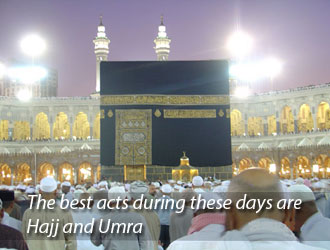
3- Performing good deeds abundantly:
It is preferable to perform good deeds more than usual on these ten days, because they draw man closer to Allah the Almighty.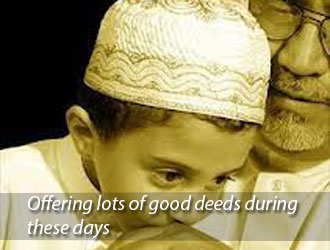
4- Udhiyah (An animal slaughtered as a sacrifice):
Udhiyah is one of the best deeds to draw closer to Allah the Almighty. Abu Hurairah said: The Prophet, may Allah have peace and blessings upon him, said: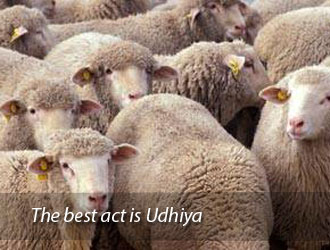
((He who has the capacity but chooses not to sacrifice may not approach our prayer place (on Eid).))
Giving meat to the poor is better than giving them money, for the latter can be used by the poor to pay their debts, while the meat will be sent only to the hungry stomachs.
5- Making sincere repentance:
Sincere repentance is the best good deed one can do on these ten days in order to seek forgiveness for his sins and shortcomings.
Dear brother, I have mentioned all the texts in Quran and Sunnah and those of scholars concerning these ten days. I hope that these texts, which we have tackled with all its details, will be a guidance for your behavior on these ten days, but generally speaking the true believer is committed to obey Allah every second of his life, not only in religious occasions. These occasions enable him to move to better levels by taking quantum leaps. I will repeat the most important point I have just mentioned: Repentance on these days is a necessity for the heedless, but the believer spends his days obeying Allah, bestowing and donating.







